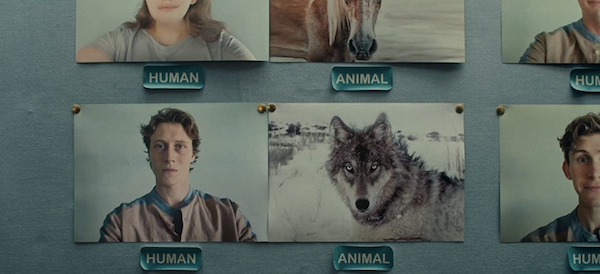Wolf: A Strange Beast That's Not Much To Howl About
Writer/director Nathalie Biancheri’s sophomore effort, Wolf, is one strange animal. Although it leads to some nice moments of absurdist comedy, it unfortunately doesn’t have much to say. Its premise opens up the doggy door to an allegory that’s left far too vague to truly satisfy.
Believing he is a wolf trapped in a human body, Jacob (George MacKay) eats, sleeps, and lives like a wolf — much to the shock of his family. When he's sent to a clinic, Jacob and his animal-bound peers are forced to undergo increasingly extreme forms of 'curative' therapies. However once he meets the mysterious Wildcat (Lily-Rose Depp), and as their friendship blossoms into an undeniable infatuation, Jacob is faced with a challenge: will he renounce his true self for love.
Imagine Yorgos Lanthimos’ The Lobster collided with Miloš Forman’s One Flew Over The Cuckoo’s Nest, and you're in the realm of what writer/director Nathalie Biancheri wants Wolf to be. It’s an intriguing combination that seems ripe with opportunity, but its execution keeps things far too muzzled for it to ever reach its full potential. Try as it might, Wolf never achieves the brilliance of the more superior films it pulls from, and it feels too indebted to them, tonally and narratively. There are certainly fascinating aspects to the production, but they’re all overshadowed by its influences and further depreciated by its flimsy screenplay.
The film takes place in "the zoo," a clinic that specializes in species dysphoria, a disorder where an individual identifies as something other than human. Naturally, the facility is run by a “Zookeeper,” a therapist who for all intents and purposes is our Nurse Ratched. Our Jack Nicholson of sorts is George MacKay’s Jacob, who believes he’s a wolf trapped in a human body. Joined by a kooky cast of Otherkin cuckoos, including Lily-Rose Depp’s Wildcat (who occupies a grey area between patient and staff member), Jacob and the other animals imprisoned in the zoo are subjected to the Zookeeper’s extreme "curative" therapy methods. Over the course of the film, an unlikely romance is formed while Jacob wrestles with being true to himself or what everyone else wants him to be.
If it sounds funny, it’s because it is. Although, Wolf isn’t the comedy you’d expect. Its humor is too subdued and overshadowed by the heavy human drama that takes center stage to really be effective. Like The Lobster, it keeps a consistently straight face no matter how absurd things get; however, it also takes itself extremely serious, which muddles the comedic impact. Presenting something absurdly comedic as serious and straight-faced wouldn’t be an issue if the film had something to say, but Biancheri takes a very boring, vanilla stance to her allegory.
Ironically, how seriously the film takes itself makes it seem like it has something genuine to say, which makes its eventual lack of substance feel like salt in an open wound. Biancheri never chooses to take a stance or give her allegory clear definition, which makes it feel shallow and pretentious. Is it about conversion therapy or transgender oppression? Is it about spiritual animals turned absurdly literal? Is it about the freedom or fear of oppression of being yourself, or is it just an ode to letting people be people? Frankly, your guess is as good as anyone’s because the film keeps everything vague and ambiguous. This was probably to maximize inclusion or relatability, but it just feels like a bit of a cop out when it’s all said and done.
Of course, it is strange in an amusing way, and there are moments when it’s utterly hypnotic. We liked the color palette and its warmly toned light blue hues. We also enjoyed certain aspects of the cinematography, like how it combined the animalistic (close-up handheld shots with shallow focus) with a restrained classical style (conventional, sturdy, locked down shots), or how it played with light and dark. There are also some wonderful flashes of fun set design, like the play pen area full of faux trees and grass. George MacKay emerges as the clear standout though, and he really goes for it, delivering a very physical performance. He sells the wolf bits — and is quite convincing to boot — but his hard work doesn’t amount to much because it’s undercut by the film’s many shortcomings.
Overall, a film where humans pretend to be animals should be a lot more fun and entertaining than Wolf strives to be. At times, it’s admittedly intriguing — MacKay’s committed performance being the clear highlight — but, unfortunately, it’s mostly forgettable. If it added more clarity to its metaphors, it probably would have a lot more depth to its bite, but as it stands, Wolf’s dulled fangs don’t leave much of mark.
Recommendation: The film hits theaters Friday, December 3rd, and unless you’re really howling at the moon for this one, we say pass on it until it’s available on streaming or VOD.
Rating: 2 howls outta 5.
What do you think? We want to know. Share your thoughts and feelings in the comments section below, and as always, remember to viddy well!



